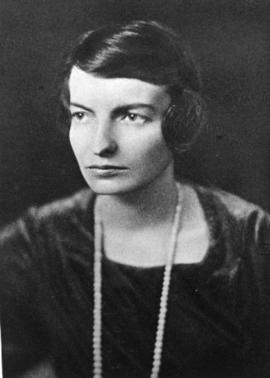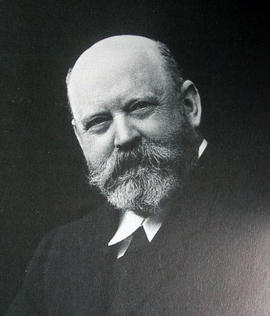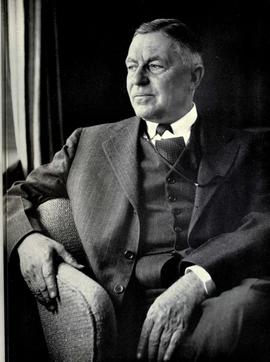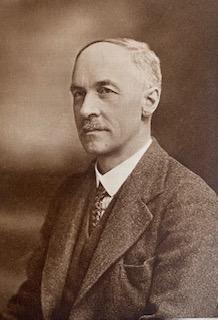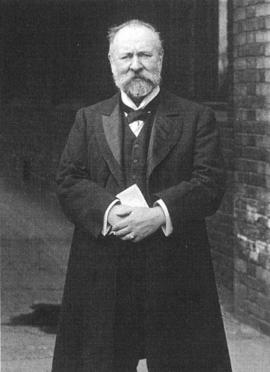Joan Beauchamp Procter was a British zoologist and herpetologist. She worked initially at the British Museum (Natural History) and later at the Zoological Society of London, as the first female Curator of Reptiles at London Zoo. She undertook substantial taxonomic work and made innovative contributions to veterinary practice and zoo displays. She wrote scientific and popular zoological articles, including early accounts of the behaviour of captive komodo dragons.
Lionel Walter Rothschild, 2nd Baron Rothschild, Baron de Rothschild was a British banker, politician, zoologist and soldier. Rothschild studied zoology at Magdalene College, Cambridge. At its largest, Rothschild collection included 300,000 bird skins, 200,000 birds' eggs, 2,250,000 butterflies and 30,000 beetles as well as thousands of specimens of mammals, reptiles and fish. They formed the largest zoological collection ever amassed by a private individual. The Rothschild giraffe, a subspecies with five ossicones instead of two, was named after him. Another 153 insects, 58 birds, 17 mammals, three fish, three spiders, two reptiles, one millipede and one worm also carry his name. Rothschild opened his private museum in 1892. It housed one of the largest natural history collections in the world and was open to the public. In 1932, he was forced to sell the majority of his bird collection to the American Museum of Natural History. In 1933, he was one of eleven people involved in the appeal that led to the foundation of the British Trust for Ornithology, an organisation for the study of birds in the British Isles. On his death in 1937, his museum and all of its contents were given in his will to the British Museum (Natural History). The Walter Rothschild Zoological Museum at Tring is now a division of the Natural History Museum
Alexander Grant Ruthven received a PhD in zoology from the University of Michigan in 1906. He worked as a professor, director of the University Museum, and Dean. He became the President in 1929. The work of Ruthven on the familiar garter snakes, published in 1908, may be regarded as founding an essentially new school of herpetology in the United States. Ruthven described and named 16 new species of reptiles. Ruthven is commemorated in the scientific names of seven reptiles: Geophis ruthveni, Holbrookia maculata ruthveni, Lampropeltis ruthveni, Lepidoblepharis ruthveni, Macropholidus ruthveni, Masticophis schotti ruthveni, and Pituophis ruthveni
Karl Max Schneider was an East German zoologist who served as director of the Leipzig Zoo from 1934 until his death. He was an expert on lions and their biology and was responsible for coining the behavioural term 'flehmen'
David Seth-Smith was a British zoologist, wildlife artist, broadcaster and author. His career included spells as Curator of Mammals and Birds for the Zoological Society of London and editor of the Bulletin of the British Ornithologist's Club and the Avicultural Magazine. He also presented nature programmes on the BBC's Children's Hour under the name 'The Zoo Man', and also ''Friends from the Zoo' on BBC Television in the 1930s. He illustrated and photographed many animals and birds in captivity and is credited with taking the only known photographs of the now extinct pink-headed duck.
By 1945, he was a Fellow of the Royal Zoological Society, Member of the British Ornithologist's Union, Hon. Fellow, New York Zoological Society; Corresponding Fellow, American Ornithologists' Union; and Corresponding Member, Societe National d'Acclimatation de France.
Richard Bowdler Sharpe was an English zoologist and ornithologist who worked as curator of the bird collection at the British Museum of Natural History. In the course of his career he published several monographs on bird groups and produced a multi-volume catalogue of the specimens in the collection of the museum. He described many new species of bird and also has had species named in his honour by other ornithologists including Sharpe's longclaw (macronyx sharpei) and Sharpe's starling (poeopters sharpii). He was Clerk in Charge of the Library at the Zoological Society of London 1867-1872. Sharpe founded the British Ornithologists' Club in 1882 and edited its bulletin. He was a Fellow of the Zoological Society of London and the Linnean Society
Sir Arthur Everett Shipley was an English zoologist and Vice-Chancellor of the University of Cambridge. He read natural sciences at Christ's College, Cambridge, specialising in zoology. Shipley specialised in the study of parasitic worms, publishing nearly fifty papers on them and leading to his election as a Fellow of the Royal Society in 1904. He stayed at Cambridge, being appointed university demonstrator in comparative anatomy in 1886, lecturer in the advanced morphology of the Invertebrata in 1894, and reader in zoology in 1908. He was elected a fellow of Christ's College in 1887 and became college tutor in natural sciences in 1892. In 1891 he was appointed secretary to Cambridge's Museums and Lecture Rooms Syndicate. In 1910 he was elected Master of Christ's College, a post he held until his death, and from 1917 to 1919 he was Vice-Chancellor of the University of Cambridge. In 1893, he published The Zoology of the Invertebrata, which became a university textbook
Sir Arthur Everett Shipley was an English zoologist and Vice-Chancellor of the University of Cambridge.
Austrian zoologist
Southwood was a British biologist, Professor of Zoology and Vice-Chancellor of the University of Oxford. He was a specialist on entomology, he developed the field of insect ecology and the development of study techniques. He wrote a textbook on Ecological Methods. He was also well known for developing the field of entomology through mentorship of a circle of researchers at Silwood Park. He was employed in the Department of Zoology at the Institute of Animal Physiology and Genetics Research
